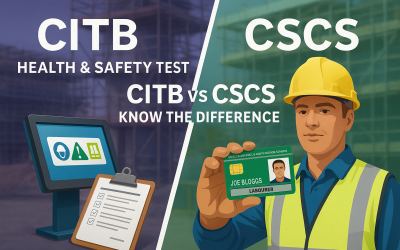How to Ace Your First CITB Test – Pass the HS&E Exam First Time
You need to pass the CITB Health, Safety & Environment (HS&E) test before you can apply for a CSCS card or progress in many construction roles. This beginner‑friendly guide shows you exactly how to ace your first CITB test. You will learn a time‑efficient study plan, the topics examiners love, and test‑day tactics that boost your confidence and score.What Is the CITB Health, Safety & Environment Test?
The Construction Industry Training Board (CITB) HS&E test assesses your understanding of on‑site health, safety, and environmental practices. Passing proves that you are site‑ready and aware of legal duties. There are several versions (Operatives, Specialist, Managers & Professionals), but each follows the same core principles.-
- Duration: 45 minutes
- Questions: 50 multiple‑choice
- Pass mark: 45/50 (90 %) for most versions
- Validity: Two years for CSCS application
Understand the 50‑Question Format
Knowing how the questions are structured lets you work smarter, not harder.-
- Knowledge‑based questions (80 %). Straightforward facts—warning signs, PPE, fire safety.
- Behavioural case studies (20 %). Scenario‑based questions that test judgement and leadership.
Proven Study Plan for First‑Time Takers
You do not need to cram. Follow this four‑week schedule:-
- Week 1: Skim the All in One CITB HS&E revision book. Flag unfamiliar terms.
- Week 2: Study one chapter daily; create flashcards for hazard colours, signage and legislation.
- Week 3: Complete at least five full mock tests on the official CITB revision app. Review wrong answers immediately.
- Week 4: Drill high‑value topics (see below) and practise two case‑study tests.
High‑Value Topics You Must Master
Roughly 65 % of the test focuses on seven areas. Master these and you almost guarantee a pass:-
- Accident reporting (RIDDOR) and emergency procedures
- Fire extinguishers and colour coding
- Working at height regulations
- Manual handling best practice
- Hazardous substances (COSHH symbols)
- Personal protective equipment (PPE) hierarchy
- Environmental responsibility (waste segregation, energy use)
The Day Before: Practical Preparation Checklist
Give yourself the best chance by organising everything before test day:-
- Confirm your photographic ID meets CITB rules.
- Print or screenshot the test confirmation email.
- Pack earplugs, a bottle of water and a layer for variable test‑centre temperatures.
- Review 20 flashcards only—avoid full tests to keep stress low.
- Plan your transport, allowing 30 minutes contingency.
On Test Day: Time Management & Technique
Arrive 15 minutes early to complete biometrics calmly. During the exam:-
- Start with confidence. The first 10 questions are usually knowledge‑based. Correct early answers build momentum.
- Flag tough items. Use the review function. Return once the easy marks are in the bank.
- Pace yourself. Spend about 50 seconds per question. You will then have a 10‑minute buffer to revisit flagged items.
- Trust first instincts. Change an answer only if you are 100 % sure.After the Exam: Next Steps Toward Your CSCS Card
Common Mistakes and How to Avoid Them
-
- Ignoring case‑study practice. Behavioural questions count for up to 10 marks—skipping them can mean a fail.
- Memorising answers, not concepts. CITB rotates its bank. Understand why an answer is correct.
- Leaving blanks. There is no negative marking—always guess if unsure.
- Not checking the screen. Verify the question number and option selected before clicking Next.
FAQs – People Also Ask
How long should I study for the CITB test?
Plan for around 15–20 hours of focused revision spread over four weeks to maximise retention and minimise stress.Can I take the CITB test online?
No. The HS&E test must be taken at an approved Pearson VUE centre to preserve exam integrity.What is the hardest part of the CITB test?
Most candidates find behavioural safety questions toughest because they assess judgement, not rote knowledge.How many times can you retake the CITB HS&E test?
You can retake as often as needed, but you must wait at least 48 hours between attempts.Does my CITB pass certificate expire?
Yes. You must apply for your CSCS card within two years of passing, or you will need to retake the test.Conclusion & Next Actions
You can ace your first CITB HS&E test by following a structured study plan, focusing on high‑value safety topics and mastering exam technique. Stick to short, consistent revision sessions, complete multiple mock tests, and prepare practically the day before. Your CSCS card—and a safer construction career—starts here. Ready to book? Call us on 0151 673 1644 or email hello@citbtestcentre.co.uk to secure your place today.Latest New & Updates
Special Assistance Options for the CITB Test
Discover every special assistance option for the CITB test—from language voice‑overs to extra time—so you can sit the exam with confidence and fairness.
CITB vs CSCS – What’s the Difference?
Confused about the CITB test and CSCS card? Learn the vital difference and the exact steps to secure your CSCS card first time.
Tips for Taking the Managers & Professionals CITB Test
Discover expert tips for taking the Managers & Professionals CITB Test and secure your CSCS card first time. Study smarter and beat the 90 % pass mark.




